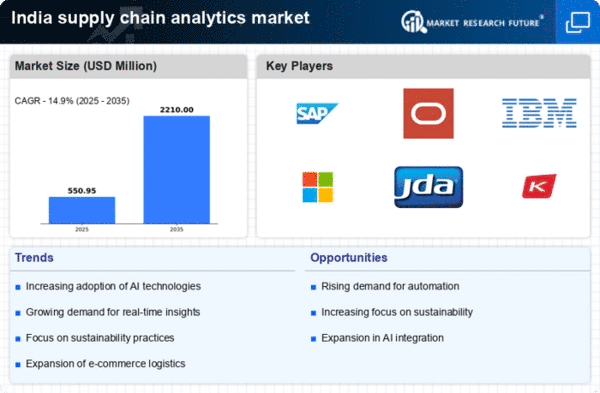Growing E-commerce Sector
The rapid expansion of the e-commerce sector in India is significantly impacting the supply chain-analytics market. As online shopping continues to gain traction, businesses are compelled to enhance their supply chain capabilities to meet consumer demands. The e-commerce industry is projected to reach $200 billion by 2026, necessitating robust analytics solutions to manage complex supply chains effectively. Companies are leveraging analytics to optimize inventory management, forecast demand, and improve delivery times. This trend indicates a strong correlation between the growth of e-commerce and the increasing adoption of supply chain analytics. Consequently, the The supply chain analytics market is likely to witness substantial growth. This growth is driven by businesses seeking to enhance their operational efficiency in response to the evolving e-commerce landscape.
Government Initiatives and Support
Government initiatives aimed at enhancing the logistics and supply chain infrastructure in India are playing a pivotal role in the growth of the supply chain-analytics market. Programs such as 'Make in India' and 'Digital India' are designed to promote technological advancements and improve supply chain efficiencies. The government has allocated substantial funds to develop logistics parks and improve transportation networks, which is expected to boost the analytics market. With an estimated investment of over $10 billion in logistics infrastructure, the supply chain-analytics market is likely to benefit from improved data availability and quality. This support from the government not only encourages businesses to adopt analytics solutions but also fosters a conducive environment for innovation and growth.
Integration of Advanced Technologies
The integration of advanced technologies such as IoT, blockchain, and big data analytics is significantly influencing the supply chain-analytics market in India. These technologies enable real-time tracking and monitoring of goods, which enhances transparency and accountability within the supply chain. For instance, the use of IoT devices can lead to a reduction in inventory holding costs by approximately 15%. Furthermore, blockchain technology ensures secure and tamper-proof transactions, which is crucial for maintaining trust among supply chain partners. As businesses increasingly adopt these technologies, the demand for sophisticated analytics solutions is expected to rise, thereby propelling the growth of the supply chain-analytics market. This integration not only streamlines operations but also provides valuable insights that can lead to better decision-making.
Focus on Risk Management and Resilience
In an increasingly volatile market environment, the focus on risk management and resilience is becoming a critical driver for the supply chain-analytics market. Companies are recognizing the importance of identifying potential risks and developing strategies to mitigate them. The ability to analyze data and predict disruptions can lead to a more resilient supply chain, which is essential for maintaining competitiveness. Recent studies suggest that organizations employing advanced analytics for risk management can reduce supply chain disruptions by up to 30%. This emphasis on resilience is prompting businesses to invest in analytics solutions that provide insights into risk factors and enable proactive decision-making. As a result, the supply chain-analytics market is likely to expand as firms prioritize risk management in their operational strategies.
Rising Demand for Efficiency in Operations
The supply chain-analytics market is experiencing a notable surge in demand for operational efficiency across various sectors in India. Companies are increasingly recognizing the need to streamline their supply chain processes to reduce costs and enhance productivity. According to recent data, organizations that implement advanced analytics can achieve up to 20% improvement in operational efficiency. This trend is driven by the competitive landscape, where businesses strive to optimize their resources and minimize waste. As a result, the supply chain-analytics market is poised for growth, with firms investing in analytics solutions to gain insights into their supply chain dynamics. The focus on efficiency not only aids in cost reduction but also enhances customer satisfaction, thereby driving further adoption of analytics tools.
















